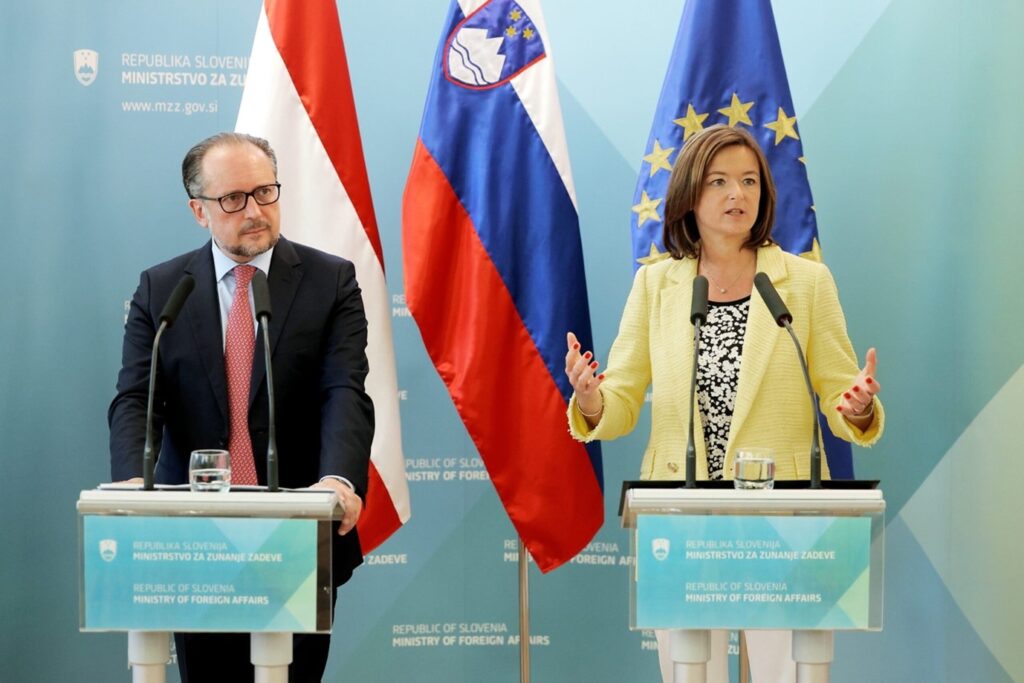Austrian Foreign Minister Alexander Schallenberg was the first head of diplomacy from any of our neighbouring countries to visit Slovenia after the new government took office. And if one would expect that the reports about the meeting would mainly be positive – as this is the beginning of new conduct of diplomacy, after all – one would be wrong. The views of Slovenia’s new Minister of Foreign Affairs, Tanja Fajon, on migration, are unacceptable to the Austrian side, and the Austrian media responded accordingly. For example, the Austrian Kleine Zeitung only briefly mentioned Fajon in its article.
During the government of Janez Janša, Slovenia returned to the diplomatic map of the world, and we also witnessed good relations with neighbouring countries. However, judging by the visit of the Austrian Minister of Foreign Affairs, Alexander Schallenberg, to Slovenia, things are about to change for the worst. Namely, the new Slovenian Minister of Foreign Affairs, Tanja Fajon, defends the position that Slovenia sees no reason to maintain border control, which our northern neighbours do not agree with.
Namely, during the peak of the migrant crisis in 2015, Austria introduced border controls with Slovenia and Hungary, which it has been prolonging ever since. In mid-May, the country decided on another extension, this time for six months, and at the time, the reasons that the representatives from Vienna provided for their decision also included the war in Ukraine. Regarding the control of the internal border in the Schengen area, the Austrian Foreign Minister said that in light of the war in Ukraine and the significant increase in illegal border crossings in recent months, there is no alternative to this measure. Meanwhile, Minister Fajon said that Slovenia sees no reason to maintain border control.
In light of the visit in question, the Austrian Kleine Zeitung was obviously bothered by the reporting of the Slovenian mainstream media, which are, of course, just the propaganda machine of the new government. “Slovenian newspapers criticise Austrian border control” is the title of an article they wrote. In its reporting, they refer to the comments of the Slovenian newspaper Dnevnik, which questioned Schallenberg’s statement that there is currently no alternative to border control. “Austrian statistics on illegal border crossings do not justify the continuation of Austrian controls on the border with Slovenia. Anyone who looks at the statistics of the Federal Criminal Police and the Statistical Office of Austria in recent years is rightly wondering why the hell the Austrians are continuing with border control on the Hungarian and Slovenian border,” Dnevnik wrote.
In its reporting, the Austrian newspaper mentions that Dnevnik refers to the time when Slovenia joined the Schengen area at the end of 2007, when the then-Austrian Minister of the Economy, Martin Bartenstein, said he was happy about that at the Šentilj border crossing, stressing that the abolition of border controls meant more freedom for both sides. “This joy and freedom lasted until the autumn of 2015, when Austria reintroduced border controls and then also extended them several times, for – in its opinion – the ‘allowed’ six months,” they wrote, adding that after the recent extension of controls by Austria, we can conclude that our joy and freedom have lasted for only half of the time since we joined the Schengen club.
The Kleine Zeitung also noted the reporting of the Večer newspaper, which stated regarding the Austrian control that the control introduced at the height of the refugee crisis in 2015 was “indefinitely” extended. The newspaper Večer also criticised a statement that Schallenberg made in Ljubljana, as he spoke about the 120 percent increase in illegal border crossings on the border with Slovenia in recent months. “Typical. If he were to give absolute numbers, they would look small and ridiculous compared to 2015. But this makes it easier to see that there is no alternative than border control for Austria,” Večer commented.
As we can see, Slovenian media reporting has not gone unnoticed abroad. However, given that the mainstream media’s reporting is in complete agreement with the views of the new government, which even before the signing of the coalition agreement let it be known that the fence on the southern border will fall, it is obvious that not everyone is so enthusiastic about the new government. Perhaps it is finally time to step out of the bubble and listen to others instead of defending the belief that something is best just because it is different from what the Janša government did.
Sara Kovač


